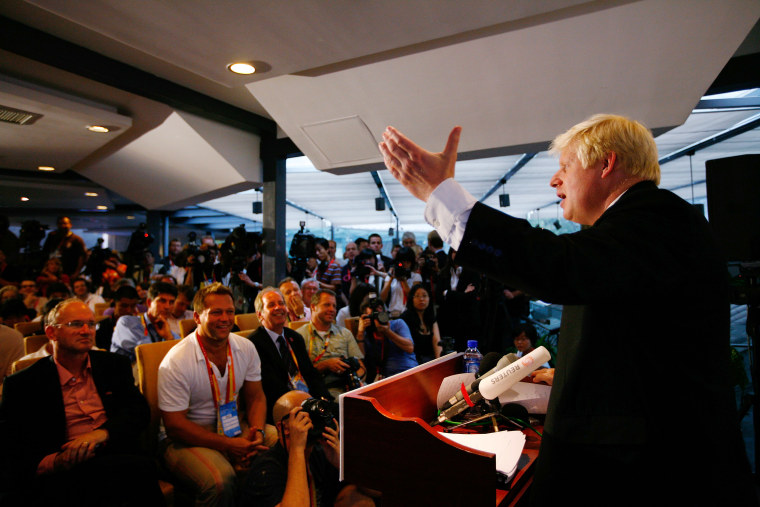The balance of power in the world often hinges on oil or military stockpiles or land, but every four years it shifts to precious metals, or more precisely, medals. And during a period beginning after World War II and ending around the time the Berlin Wall came down in 1989, there was no more bitter struggle for gold, silver and bronze than the one between the former Soviet Union and the United States.
In those days, before the Soviet Union, East Germany and their ilk disintegrated, the Olympic Games weren’t a friendly competition celebrating the joy of sport (and frankly, maybe they have only ever been so in concept) but rather a fanatical race for supremacy as well as a tussle for bragging rights to the better way of life. As the Cold War raged, with missiles pointed at each other, the Soviets and the Americans applied a war-like zeal to Olympic competition.
Speaking of faded empires, there was once a time when England ruled the world, when the phrase “the sun never sets on the British Empire” was testimony to its vast reach and dominance. Meanwhile, China – once considered a sleeping giant – is now wide awake, on the global economic scene and elsewhere.
What do these four countries have to do with each other aside from their rich and colorful histories?
Soon the torch will fade in Beijing, and attention will revert to London and the next Summer Games in 2012. That will happen just as the United States, China, Russia and Great Britain occupy the top four spots in the medal standings. If history is any indication, Great Britain as the host country will do in 2012 what China did in 2008 – assert itself on the world stage and in the medals race.
The “way of life” angle is still valid, but less prominent. China has embraced capitalism, which creates at least the impression that it has a progressive streak. Residents of Tibet as well as thousands of dissidents and critics clearly would dispute that on human rights grounds. But China’s bustling economy and its staggering production of these ’08 Games has ingratiated it into a respected place among the world’s nations, whether others eye it warily or not.
When it comes to medals, though, China used the opportunity in much the same way that the United States did in ’84, and in the way the then-Soviet Union tried to do in ’80 if not for the boycott. Those host nations took the opportunity to seize the public-relations stage through its athletes. In ’84, the United States destroyed the competition with 174 medals overall, including 83 gold. In ’80, the Soviet Union powered to No. 1 with 195 medals overall, 80 of them gold.
Of course, the propaganda efforts by both were muted somewhat by the facts that the United States boycotted the Soviets’ bash in 1980, while the Soviet bloc nations returned the favor in ’84.
There were no such significant actions taken in 2008, and although there is no guarantee some major powers might not stiff London in 2012, there isn’t much appetite for boycotts anymore after the ugliness, emptiness and futility of the aforementioned two.
Great Britain will most certainly try to capitalize on its home-nation advantage in 2012 by revving up its Olympic program between now and then and pouring more money into the training of its athletes in an effort to announce its claim to No. 1. It already has shined in activities such as crew, sailing, swimming and cycling, but it certainly will expand its sporting realm beyond those without having to resort to training toddlers for competition as adolescents, as the Chinese have been accused of doing.
Whether Great Britain can overtake both the United States and China through its efforts between now and 2012 depends somewhat on whether those two countries allow themselves to be unseated. Both nations have been fairly consistent about coveting hardware; in 2004, the U.S. led in both overall medals (102) and gold (36). China was second that year in golds (32), but third overall behind Russia (92 to 63).
Yet a slight bit of incentive will be missing in 2012 for the Americans and the Chinese. The former won’t be going to try and spoil the celebration of an ideological and economic competitor. The latter won’t be attempting to spread its rapidly expanding influence via athletics.
Great Britain doesn’t have a superpower mentality and will not approach the 2012 Games with the same obsession with honor and image that China has displayed this summer. Still, it’s the Olympics, and there will be gargantuan efforts taken to make a jolly good showing.
Great Britain only had 30 medals in all in 2004 – good for 10th place – with just nine of them gold. Thus far in the 2008 Games, the Brits have tallied 47 medals overall, with 19 gold, for fourth place. If they keep up that rate of improvement, it will cause the superpowers to rethink their strategy, while perhaps enticing Great Britain to try and take back some of its possessions.
And what of Russia, the fallen giant that is rising anew in a different form? Chances are that it will continue to put emphasis on its athletic programs between now and 2012 so it can maintain respect among other nations. If it continues to pull maneuvers like it did with the recent foray into Georgia in the coming four years, it will jog memories of a darker era when Russians and their allies approached any international interaction with sinister intent.
One thing is certain: London in 2012 will be a more joyful place than Beijing in 2008. While the Chinese have spared no expense, most reports suggest it hasn’t translated into fun, fun, fun. London will surely lighten up the Olympic Games.
That is one competition Brits have already won without even lifting a finger.
